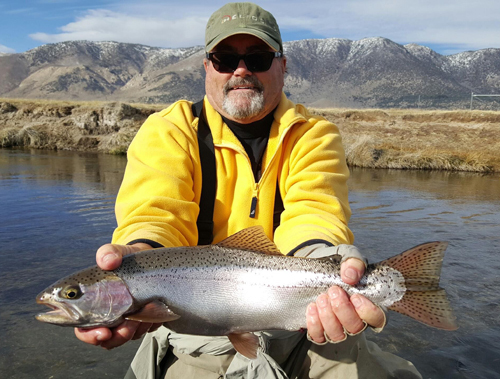
Report Date:
https://tomloe.com/Water conditions are excellent, & clarity is very good. The “green slime” that plagues the UO is now becoming an issue as it covers the bottom in some sections. Overall water temps are much warmer the last few years below Hot Creeks inlets. This accelerates aquatic weed growth, and makes it tough to keep your flies clean. I believe the cutthroat run will be earlier this season, & we could begin to see the “red sides” on the move by April if the weather pattern continues. Seeing some first generation BWO’s after 2pm with increased feeding from the smaller resident trout. The bulk of this winters migratory rainbows we call “Crowley Steelhead” are returning back to the lake, & fishing has slowed for sure. There are still decent numbers of larger fish; but you will have to cover a lot of water to locate them. You will observe trout paired up in shallow water staged up on the gravel beds. They can be very spooky, & stealth tactics are needed to get a few casts on them before they bolt. Try removing your Under-Cator and “swing” a crystal leech, agent orange, or attractor pattern in front of them. First generation BWO’s, & small midges are triggering feeding activity from the resident trout on the warmer days. Attractor patterns will get you looks from the bigs. SJ worms, crystal Vanderleeches, crystal soft eggs, Assassins, and Agent Orange patterns have got us into them while nymphing below an Under-cator. Size 16/18 adult Blue Winged Olive patterns, & small parachute midges will replicate the hatches. Flashback pheasant tails, & Assassins are spot on replicas for the nymph stage of this cold water mayfly. Use #18-22 gillies, crystal chironomid pupa, broken back midges, crystal tiger, & zebra midges for nymphs that imitate midge larva or emergers. Caddis larva are present on the stream bed pumice rocks now. Olive crystal caddis imitations can be a good call for the resident fish grubbing the bottom during warmer periods. Parachute adult midges will get you looks when the fish are feeding on the “clusters” late afternoons. Please don’t squeeze the egg laden hens near the belly. That will cause the roe to discharge prematurely. Look for oval depressions that appear brighter, or scraped clean on the riffles below pools. These are active spawning nests; or “redds” and you must avoid stepping on them.